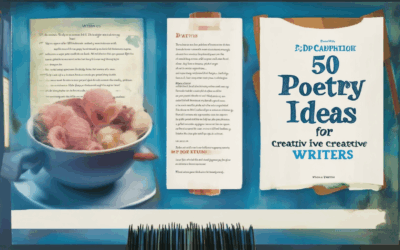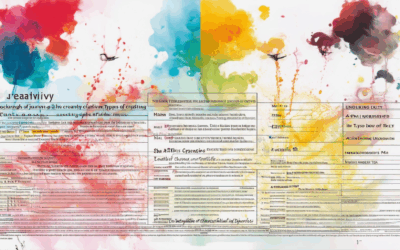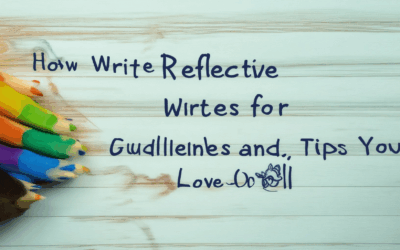Unlocking the wellspring of creativity that fuels poetry is a journey every aspiring poet embarks on. Whether you’re a seasoned writer seeking fresh ideas or a novice looking to discover your unique voice, finding writing inspiration for poets can often feel like a daunting task. However, with the right guidance and tools, you can unlock your potential and transform ordinary moments into extraordinary verses. This guide offers a comprehensive exploration of how to find inspiration, overcome writer’s block, and harness the power of creativity to craft poetry that resonates deeply with readers. From delving into deep themes to leveraging the beauty of nature and personal experiences, we’ll walk you through the various ways to spark your imagination and channel your passion into meaningful poetry. Let’s uncover the secrets to writing inspiration for poets and embark on a journey that celebrates the art of self-expression and the magic of words.
Key Takeaways
- Nature as a primary source of poetic inspiration.
- Personal experiences driving creativity and authenticity.
- Emotions as the core essence of poetry.
- Addressing social issues through poetry for impact.
- Influence of historical figures shaping contemporary poetry.
- The intersection of music and art with poetry.
- Role of spirituality in elevating poetic expression.
- Embrace nature to foster creativity.
- Reading great poetry as a foundational practice.
- Engage in personal reflection through journaling.
- Experience art and music for cross-disciplinary inspiration.
- Experiment with poetic forms to expand creativity.
- Collaborate with others to enrich perspectives.
- Find inspiration in everyday moments.
- Maintain a consistent writing routine.
- Explore cultural diversity for broadened horizons.
- Embrace authenticity and vulnerability in poetry.
- Motivated by love of words and their texture.
- Driven by rhythm and rhyme in poetic structure.
- Focused on storytelling for narrative engagement.
- Expressing complex emotions authentically.
- Building a supportive community of poets.
- Inspired by observations of the world.
- Driven by overcoming challenges and achieving rewards.

How to Find Inspiration to Write Poetry
To find inspiration for writing poetry, consider the following structured approach:
- Explore Personal Experiences : Reflect on your emotions, memories, and life events. Journaling or meditating on these thoughts can often spark creative ideas.
- Set Clear Goals : Define what you aim to express through poetry. Whether it’s love, loss, or social issues, having a purpose can guide your creativity.
- Engage with Literature : Read widely, including works by established poets. Study their techniques and themes to inspire your own style.
- Journal Regularly : Keep a poetry journal to document observations, feelings, and ideas. Over time, this habit can reveal recurring themes and imagery.
- Seek Feedback : Share your work with trusted friends or poetry communities. Their insights can help you identify strengths and areas for growth.
- Immerse Yourself in Nature : Spend time outdoors to observe the world around you. Nature often provides unique imagery and emotions that translate well into poetry.
- Experiment with Forms : Try different poetic structures like sonnets, haiku, or free verse to explore your creative boundaries.
- Learn from Masters : Study the works of influential poets to understand different styles and approaches. This can reignite your passion and provide fresh perspectives.
- Stay Curious and Open-Minded : Approach poetry as an exploration. Stay curious about the world and willing to experiment with new ideas and words.
By incorporating these strategies, you can unlock your creative potential and consistently find inspiration to write poetry. Remember, the journey of writing is as important as the destination, so enjoy the process and let your imagination guide you.
How Poets Get Motivated to Write
Poets find motivation through various strategies that fuel their creativity and drive. Here are some effective approaches:
- Embrace Inspiration : Poets often draw from diverse sources. Reading widely, whether fiction, memoirs, or news, can spark fresh ideas and inspire unique perspectives.
- Set Personal Goals : Establishing targets, like completing a poem or experimenting with a new form, creates a sense of purpose and accountability.
- Join Writing Communities : Engaging with peers through platforms like Silken Drum offers support, feedback, and shared experiences, which can reignite passion.
- Explore New Genres : Trying different forms or styles challenges poets to grow and discover new avenues for expression.
- Connect with Nature : Many poets find solace in the outdoors, observing the world around them to inspire vivid imagery and emotions.
- Reflect on Life Experiences : Drawing from personal history allows poets to create authentic and meaningful work, often resonating deeply with readers.
By combining these techniques, poets can sustain their creativity and continue to produce impactful literature.

Where Do Poets Find Ideas for Poems?
Poets find inspiration in a variety of places, allowing their creativity to flourish through observation, reflection, and exploration. Here are some common sources of inspiration:
- Observing the World: Poets often draw from everyday sights, sounds, and experiences. Whether it’s a sunrise, a bustling city street, or a quiet moment in nature, these observations can spark ideas.
- Reflecting Inward: Many poets turn to their personal emotions, thoughts, and memories. Journaling or meditating on these introspective topics can reveal deeper layers of inspiration.
- Reading Other Poets: Studying the works of established poets can provide insight into different styles, techniques, and perspectives. This exposure can inspire new ways of approaching one’s own poetry.
- Listening to Music: The rhythms and melodies of various musical genres can influence a poet’s language and structure. Different music can evoke different emotions and imagery.
- Engaging in Conversations: Overhearing conversations or participating in discussions can provide raw material for dialogue-based poems. These spontaneous interactions often feel natural and authentic.
- Exploring Past Works: Reviewing old poetry can reignite passion for forgotten themes or motifs. This exercise can also highlight new angles for revisiting familiar ideas.
- Playing with Language: Experimenting with words, sounds, and syntax can lead to innovative uses of language. Poets might manipulate words to create unique metaphors or similes.
- Seeking Prompts: Asking for suggestions from friends, family, or fellow writers can provide structured guidance. These prompts can help explore new subjects or approaches.
- Studying Visual Art: Paintings, sculptures, and photographs offer rich visual inspiration. The imagery and composition in these works can translate into descriptive elements in poetry.
- Connecting with Communities: Joining poetry communities or forums allows poets to interact with like-minded individuals. This collaboration can lead to collective inspiration and shared projects.
- Attending Events and Workshops: Participating in poetry readings, slams, or workshops exposes poets to diverse perspectives and techniques. These experiences can inspire new ideas and approaches to their craft.

What Inspires a Poet?
Poets are inspired by a vast array of sources that fuel their creativity and imagination. These sources can be as diverse as the natural world, personal experiences, and societal issues, each contributing uniquely to the poetic process.
Nature
Nature often serves as a primary source of inspiration for many poets. The beauty of rivers, mountains, forests, and seasons provides endless material for reflection and artistic expression. Poets like William Wordsworth found solace and inspiration in the Lake District, while Rainer Maria Rilke was deeply moved by the Swiss Alps.
Personal Experiences
Personal experiences are a wellspring of poetic inspiration. Whether it’s the joy of falling in love, the pain of losing someone, or the struggles of everyday life, these moments become the raw materials for poetry. Many poets channel their own histories and emotions into their work, creating something deeply personal yet universally relatable.
Emotions
Emotions are the essence of poetry. Poets often delve into complex feelings like love, loss, anger, and hope to articulate the human condition. Sylvia Plath’s “Ariel” and John Donne’s “The Flea” are testament to how emotions can be transformed into powerful poetic expressions.
Social Issues
Many poets choose to address societal problems and inequalities through their work. Issues like poverty, war, and injustice inspire poets to speak out and raise awareness. Pablo Neruda’s “I Love My Country” and Allen Ginsberg’s “Howl” are poems that reflect a deep commitment to social change.
Historical Figures
Historical events and figures can also be a rich source of poetic inspiration. Poets like Derek Walcott drew inspiration from the history and culture of his native St. Lucia, while T.S. Eliot was influenced by the cultural shifts of his time. Historical figures themselves, such as Shakespeare and Whitman, remain enduring sources of inspiration for contemporary poets.
Music and Art
Music and art often intersect with poetry, providing both motivation and structure. Poets like Bob Dylan found inspiration in folk music, while visual artists like Claude Monet inspired Georgia O’Keeffe’s work. The interplay between these forms can lead to cross-disciplinary creativity.
Spirituality
Spirituality and mindfulness are increasingly influential in poetry. Poets like Rumi and Mary Oliver find inspiration in their spiritual journeys, often turning to nature and introspection to uncover deeper truths. This connection to the divine or universal energy can elevate poetry to a higher level of artistry.
Poetry is a timeless art form, and the sources of inspiration continue to evolve with each generation. Whether it’s through personal experiences, emotional exploration, or a connection to the broader world, poets remain driven by a profound desire to express the human condition in meaningful ways.
How to Inspire a Poet
To inspire a poet, consider the following approaches:
- Embrace Nature:** Explore the beauty of the world around you. Spending time in natural settings, such as walking in a forest or sitting by the ocean, can evoke emotions and imagery that inspire poetry.
- Read Great Poetry:** Expose yourself to the works of renowned poets like William Shakespeare, Emily Dickinson, and Pablo Neruda. Their unique styles and themes can spark creativity and provide a foundation for your own poetry.
- Personal Reflection:** Encourage journaling or self-reflection. Writing about your personal experiences, emotions, and thoughts can reveal deeper aspects of yourself that may translate into powerful poetry.
- Engage with Art and Music:** Allow yourself to be influenced by other forms of art, such as paintings, sculptures, or classical music. These can provide inspiration through their unique textures and narratives.
- Experiment with Forms:** Try different poetic forms, such as haiku, sonnet, or free verse. Exploring new structures can challenge your creativity and open up new avenues for expression.
- Collaborate:** Work with others who share your passion. Collaborative projects can introduce new perspectives and ideas, enriching your poetry with diverse viewpoints.
- Seek Inspiration in Unexpected Places:** Look for inspiration in everyday moments, such as a child’s laughter, a quiet street, or a simple flower. The smallest details can often lead to the most profound insights.
- Write Regularly:** Establish a consistent writing routine. Even short sessions can help maintain creativity and develop your unique voice over time.
- Explore Cultural Diversity:** Read poetry from different cultures and traditions. This can broaden your horizons and introduce you to new themes and approaches that may inspire your work.
- Be Vulnerable:** Embrace the emotional depth of poetry. Write about your fears, hopes, and struggles. Authenticity often leads to the most moving and resonant poetry.

What Motivates Poets?
Poetry is a deeply personal and creative endeavor, driven by a variety of motivations that blend emotion, artistry, and personal growth. Here are some key factors that motivate poets:
- The Love of Words
- Many poets are drawn to the beauty, sound, and texture of words themselves. The act of crafting verses becomes a joyful exploration of linguistic possibilities, akin to building with LEGO bricks.
-
Rhythm and Rhyme
- The musicality of poetry, characterized by rhythm and rhyme, is a significant motivator. The satisfying cadence of a well-crafted line can elevate a poem to profound heights.
-
Storytelling
- Poets often aim to tell stories, whether fictional or reflective, offering readers a narrative escape or a window into the author’s soul. This storytelling urge can stem from a desire to share observations or emotions.
-
Emotional Expression
- Poetry serves as a powerful medium for expressing complex emotions. Poets may be motivated by the wish to articulate feelings that are difficult to convey through prose alone.
-
Community and Connection
- Joining a community of fellow poets can be invigorating. Platforms like Silken Drum provide spaces for collaboration, inspiration, and mutual encouragement, fostering a sense of belonging.
-
Inspiration and Observation
- The world around us is a constant source of poetic inspiration. Observing nature, human behavior, or personal experiences can ignite creativity and drive the creation of new works.
-
Challenges and Rewards
- The process of crafting poetry itself presents challenges that can be rewarding to overcome. Seeing one’s words resonate with others or being published can offer a profound sense of achievement.
In essence, poets are motivated by a blend of intrinsic passion for their craft, the desire to connect with others, and the pursuit of artistic excellence. Whether through the love of words, the joy of rhythm, or the storytelling impulse, poetry remains a timeless medium for expression and inspiration.




0 Comments